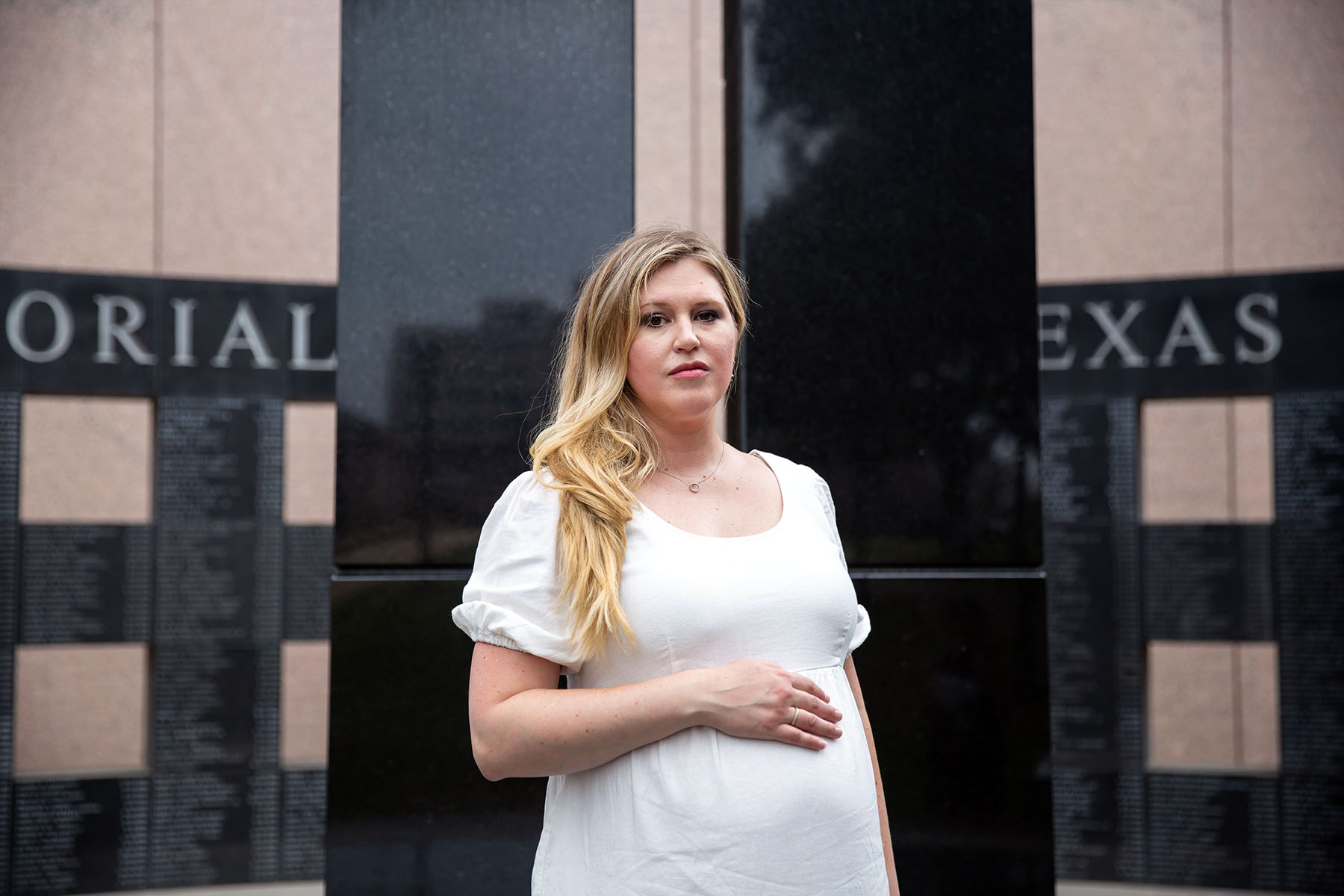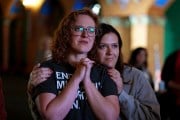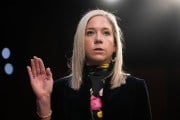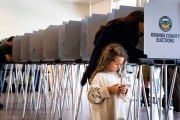Lauren Miller already had a bad feeling about how things would turn out.
She couldn’t stop the nervous tears, whether she was watching Instagram videos with her toddler, or sitting in on work calls. No matter how hard she tried, she couldn’t stop imagining what might happen later that evening — that, for all her efforts to spotlight abortion, for all the times she’d shared her own story, it still somehow wouldn’t be enough — that Election Day would end in heartbreak.
Miller, who lives in the Dallas area, had thrown herself into showing why the presidential election was tied to the future of abortion rights. She testified in front of Congress about the overturn of Roe v. Wade, appeared on national television and traveled to Maine to speak at a campaign event on behalf of Vice President Kamala Harris. In Texas, she campaigned for U.S. Rep. Colin Allred, a Democrat running to unseat Republican anti-abortion Sen. Ted Cruz.
She felt like it was her duty. Miller entered the spotlight in March 2023, when she became one of the first five women to sue a state over its abortion ban, in a case known as Zurawski v. Texas. She talked publicly about how, at her 12-week ultrasound when pregnant with twins, she discovered that one of the fetuses she was carrying likely had a devastating anomaly. Testing confirmed it was trisomy 18, a condition with slim odds of survival. She needed an abortion to improve the chances the healthy twin might live — but her only option for health care involved traveling to Colorado, a trip she made in October 2022.
Miller was one of a group of women who relived the stories of their abortions — intense, private traumas — over and over for large audiences, hoping that doing so would lead Harris to victory. The 2024 election, the first presidential race since the fall of Roe, put an unprecedented focus on abortion rights. Harris regularly devoted events and speech time to the impact of the 2022 Supreme Court decision.
Harris’ campaign represented a shift in how politicians talk about abortion; equally revolutionary was the heavy emphasis on storytellers. In politics, abortion has long been highlighted in abstract terms, with politicians and activists only occasionally sharing personal experiences with the heavily stigmatized health care. Now, instead of the exception, personal stories have become the rule, and the microphone handed from professional political actors to people who, had they not sought an abortion, might never have found themselves on the campaign trail. The switch has helped change how Americans talk and think about abortion. But it’s not without its personal costs.
-
Read Next:
“It was essential that we constantly made ourselves vulnerable, so this has been a very personal loss,” Miller said after the November election, in which President-elect Donald Trump sailed to victory. “For me, it’s been two years of really being very vulnerable about this, and recognizing that, at the end of the day, some people just didn’t care.”
Trump, who took credit for nominating the justices who overturned Roe, won every battleground state. The president-elect has been unclear about how he would handle abortion, though Project 2025 — a policy blueprint authored by a collection of former Trump advisers — calls for major federal restrictions. Trump said he would veto a federal ban. For the women speaking out this past election, that wasn’t enough; many said they fear he and his advisers will still take steps to limit access to abortion, pointing to Project 2025.
Democrats, many of whom campaigned on abortion access, lost the U.S. Senate and could not take control of the House from Republicans.
For the people who shared their stories, those losses are painful — but they are nowhere near the end of the road. Even with the election over, the women who shared their stories on the campaign trail say their mission to transform the public narrative of abortion is only beginning.
Some are brand new to politics. Gracie Ladd, an oncology nurse in Wisconsin, had never thought of herself as an activist before. She had her abortion this past February, when 20 weeks into her pregnancy she learned that the fetus was developing without kidneys or a bladder and with a series of heart defects. It was a collection of anomalies that meant if she carried her pregnancy to term, her son, Connor, would likely die soon after being born. Only one hospital in her state performs abortions at that point in pregnancy; instead, she had to travel to Chicago for care.
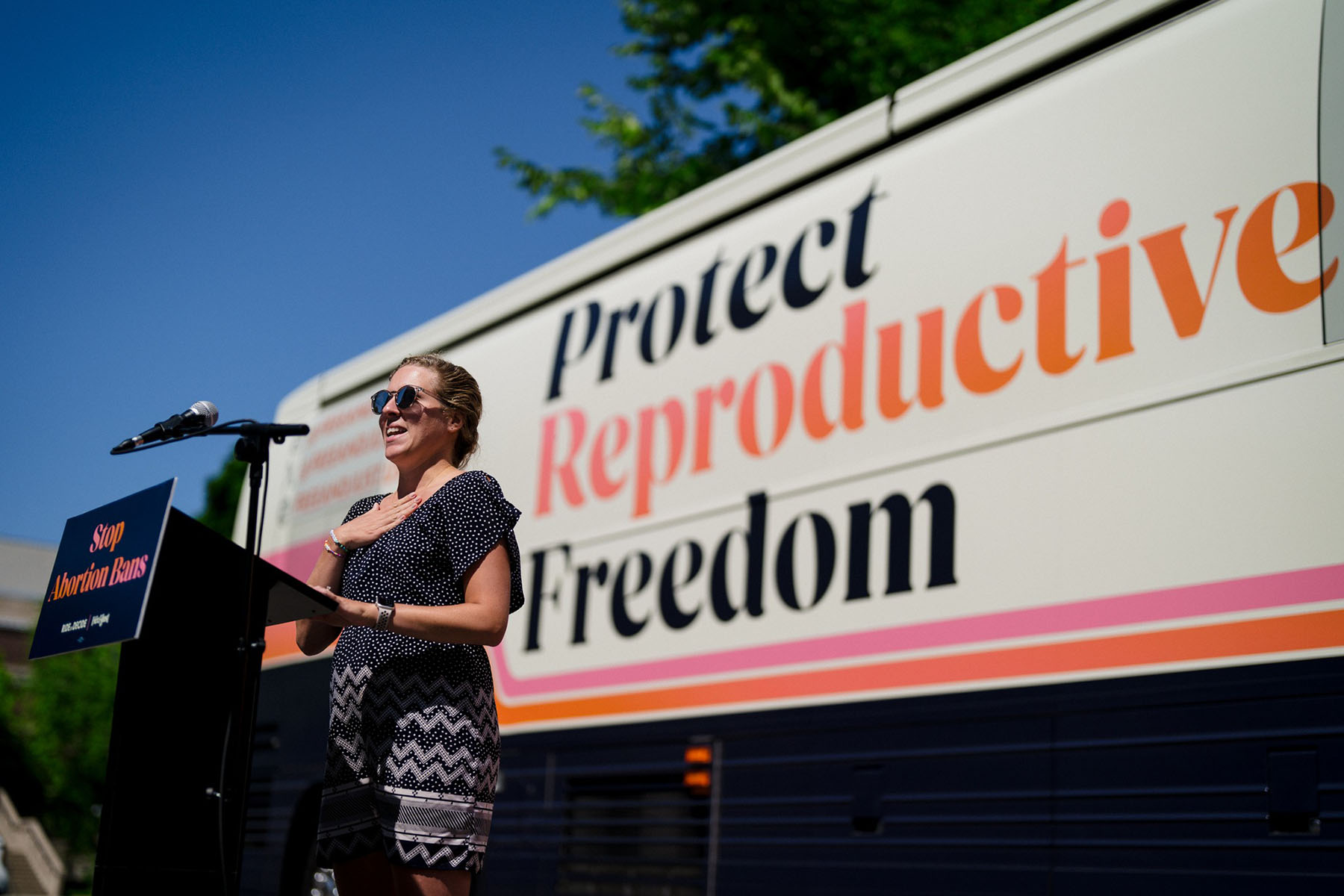
Ladd joined an online support group where she saw a post from Free and Just, a reproductive rights advocacy group, calling for people to share their stories. Maybe, she hoped, telling people about why she terminated her pregnancy would help them understand what abortion meant to so many people — and the implications of taking the option away.
Through Free and Just, Ladd said yes to everything she could, whether that meant speaking to local news outlets or at an abortion rights event. She flew to Washington, D.C., to talk about her abortion before members of Congress.
Throughout these appearances, she heard firsthand from people who hugged her and thanked her for her story.
Sharing helped her, too.
“Every time I tell my story, it gets easier to do it without crying or feeling the grief,” she said. “I feel like I’m honoring my son, Connor, by continuing to talk about him. People can hear what happened and hopefully change some minds.”
Ladd was devastated to find out later how many of those same people who offered their support — people she knew personally, who understood what an abortion ban could mean to her — voted for Trump, anyway. It felt, she said, as if they’d prioritized their pocketbooks over her rights, and in particular over the potential effects if a Trump administration follows through on Project 2025’s anti-abortion proposals.
-
Previous Coverage:
-
Previous Coverage: Abortion is front and center at the DNC — and the message is about freedom
Still, she plans to keep going, talking about her abortion wherever it could influence people. Even if the presidential election is over, states will continue to litigate abortion rights, including Wisconsin, where the state Supreme Court is currently weighing whether to reinstate a near-total ban that was passed in 1849. Listening to oral arguments in that case, she heard the justices talk about what that would mean for people like her: those who received abortions because of anomalies discovered after 20 weeks.
“I can’t say for certain it’s because of my story that now it’s starting to be in the narrative,” she said. “But I can at least feel like maybe I made a change in my own state.”
Amanda Zurawski, another plaintiff in the Texas case and a regular surrogate for Harris, cried for days after the election. She called her mother, a lifelong Republican who voted for Harris this election cycle, and got the same advice she’s now offering others: “It’s really scary, but we have to pick ourselves up. We have to keep fighting.”
Zurawski filmed a campaign ad for the Democratic presidential ticket. She told the story of her abortion — which she only received after contracting sepsis, an infection that put her life at risk — at the Democratic National Convention this August.
Through sharing her experience, she found a community and a purpose. Every time she spoke at a rally, at least a handful of people approached her afterward to talk to her about their abortions. One woman was 85 years old; she told Zurawski that it was her first time telling anyone.
“Giving a voice to these stories is really powerful,” Zurawski said. “It was really empowering for them and motivating for me.”
-
Read Next:
There’s a surreal quality to the sudden end of the election, and a sense of loss, said Dr. Austin Dennard, an OB-GYN from Texas and another Zurawski plaintiff turned campaign surrogate. She spoke at several Harris rallies, and her story was featured in a campaign ad that aired during this past January’s NFL conference championship games.
By the end of the election cycle, Dennard was frequently traveling from Dallas to campaign events in other states, often heading to the airport still wearing the scrubs from her overnight shift. She doesn’t know what her advocacy will look like moving forward — only that her work isn’t over.
“We are just regular, ‘normal’ people who had something horrible happen to us and wanted to make change from our tragedies,” she said. “We never aspired to be in politics but fell into it for the cause.”
Abortion storytellers worked up and down the ballot, campaigning not just for Harris but for Democratic candidates for the House and Senate and in favor of abortion rights ballot measures.
For Montana resident Anne Angus, who filmed a campaign ad for Democrat Jon Tester’s failed U.S. Senate campaign, that meant sharing her story about getting an abortion in November 2022, only months after the end of Roe. The procedure is legal in her state until fetal viability, which varies between pregnancies, but typically occurs between 22 and 25 weeks.
That wasn’t enough time for Angus, who learned at a 19-week check-up that something was wrong with the fetus. It took another several weeks for her to get follow-up genetic testing, confirming the diagnosis: a rare anomaly called Eagle-Barrett Syndrome, in which abdominal and urinary tract muscles are either partially or completely missing. If she gave birth, her child would need intensive medical care, likely dialysis and even kidney transplants. She and her husband decided on an abortion. But by the time she could actually receive care she was 26 weeks pregnant. The closest clinic that would treat her was in Colorado.
The next year, when Montana legislators began debating new abortion laws, Angus showed up at the statehouse; if they were going to talk about something that could affect her, she wanted them to see her face as she shared her experience. She ended up testifying in favor of a bill to eliminate the state’s restrictions on abortion. It was her first foray into activism.
“You’re the boogey-man, you’re the ‘abortion up until birth,’ ‘abortion after birth murder’ nonsense rhetoric that’s flying around,” she said. “They’re talking about me. I’m not this monster they’re making me out to be — I’m a loving mother who had to make an impossible decision.”
Over and over again, she said, she heard from people who said her story changed their minds on abortion: a distant connection on Facebook, clients at the local gym where she coaches. Getting that reaction has been stunning, she said: “It’s completely changed my life.”
Angus wasn’t surprised when Tester lost his race to an opponent who mocked people concerned about abortion rights. But she sees the difference she believes stories like hers have made. Montana was one of the seven states to pass a ballot measure enshrining abortion protections into the state constitution, establishing a state right up until fetal viability. “America overwhelmingly understands this is a critical aspect of women’s health care,” she said.
Still, she said, it’s not enough. Since Montana’s protections only extend to fetal viability, they likely wouldn’t have helped her get an abortion in the state. Angus is now hoping to become a parent through in vitro fertilization. She worries that Republican ascendance in Washington could lead not only to restrictions on abortion, but to the fertility regimen, which has been made vulnerable thanks to an anti-abortion ideology known as “fetal personhood,” a belief that embryos deserve the same legal protections as people.
All she can do, she said, is keep talking about her experience — and hoping that will eventually break through.
“I have no doubts we’re going to see attacks on reproductive health care,” she said. “I think storytelling’s going to be even more important than ever.”
